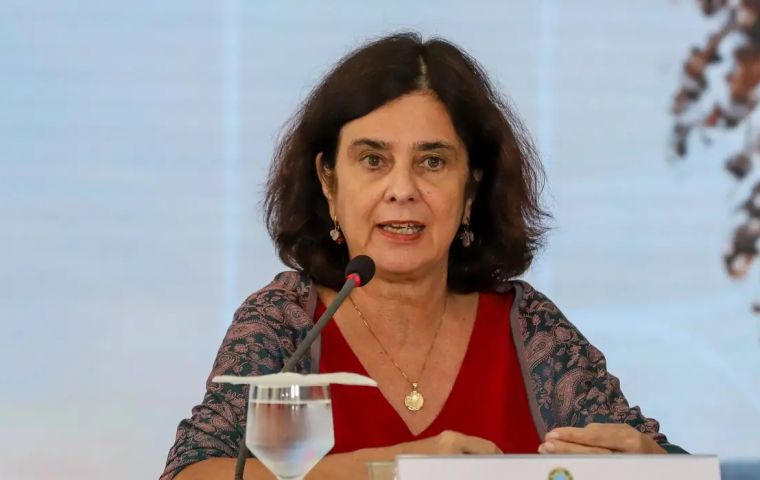MercoPress. South Atlantic News Agency
Brazil to build memorial site for Covid-19 victims
 The pandemic is over but Covid-19 is still around, Trindade warned
The pandemic is over but Covid-19 is still around, Trindade warned Brazilian authorities will build a memorial in Rio de Janeiro to honor the some 710,000 people who died of COVID-19 during the international crisis, Agencia Brasil reported.
Exactly four years after the World Health Organization (WHO) classified the situation as a pandemic, Health Minister Nísia Trindade explained that her ministry's Cultural Center in the South American country's former capital had been chosen for the tribute.
“When we talk about a memorial and a memory policy—because that’s what we’re proposing—we’re not confining the Covid-19 pandemic to the past. Like all reflections on memory, we’re aware of the present political component of memory actions. At the same time we remember that, despite having overcome the health emergency, we have not overcome Covid-19 as a public health problem,” Trindade underlined.
During the opening of the Seminar for the Design and Creation of the Covid-19 Pandemic Memorial, the minister recalled that the WHO was currently discussing the creation of an instrument for dealing with emergencies and pandemics to avoid scenarios like the one recorded in June 2021 to be repeated because although vaccines against Covid-19 were developed, people had limited access to them “not because of denialism, as we experienced in Brazil, but because of inequality in the distribution and production of vaccines and other supplies,” she also explained.
“At the same time, strengthening [Brazil’s national health care network] SUS has to be part of this learning process because only a powerful and resilient health system can cope with possible and future pandemics that the whole world is discussing,” she further argued.
“When we talk about the memorial, we talk about the important relationship between memory and history. We don’t limit ourselves to the past, but we also think about what kind of project we want for health, for Brazil, for democracy, and for the world,” the minister insisted.
“In Brazil, it has been aggravated by the state’s lack of responsibility in coordinating measures to combat it, by the dismantling of public services, and by the denialism in the fight against it,” said Rosângela Dornelles of Brazil's National Network of Covid Victims and Family Organizations.
“We must remember the bravery of our public health care workers, who faced this disease with their lives. Even before Covid-19 and even more so now in the post-pandemic period, the defense of SUS requires that we consider re-dimensioning in order to provide effective responses to current and future demands guided by an expanded concept of health care,” said the family doctor, citing challenges such as restrictions in care during the pandemic, as well as social inequalities and the climate crisis.
“The WHO reminds us that despite the emergency having passed, we’re still living with a virus that mutates and can continue to cause illness and death. The pandemic has left its mark of deep suffering on Brazilians. A dramatic process experienced by the majority of families. This requires us to promote the defense of human dignity and life. We must hold public and private managers accountable—whether they are negligent or omissive—and recompose social protection and rights policies in an articulated manner, with boldness and expanded expectations.”
(Source: Agencia Brasil)




Top Comments
Disclaimer & comment rulesCommenting for this story is now closed.
If you have a Facebook account, become a fan and comment on our Facebook Page!